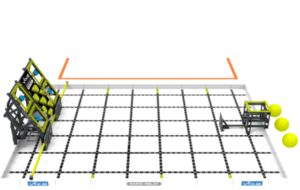VEX IQ competitions are organized events where teams of students showcase their robots and compete against each other in various challenges. These competitions aim to promote teamwork, problem-solving, and STEM skills while providing an exciting and engaging environment for students to apply what they have learned.
The specific details of VEX IQ competitions can vary, but they generally involve teams designing and building robots using VEX IQ kits within certain specifications and constraints. The competitions often revolve around a central theme or game, which sets the context and objectives for the robots’ tasks.
Teams are typically required to navigate obstacles, manipulate objects, or complete specific missions using their robots. The challenges can include activities such as picking up and stacking objects, pushing or moving items, traversing uneven terrain, solving puzzles, or scoring points in designated areas.
During competitions, teams compete in alliance-based matches, where multiple teams form alliances and work together to achieve common goals. Each match usually consists of a set time limit during which the teams’ robots must perform their tasks, often with additional points awarded for specific achievements or strategies.
Judges evaluate the robots’ performance, design, innovation, and teamwork. They consider factors like the effectiveness of the robot’s mechanisms, the quality of programming, the creativity of the design, and the collaboration and sportsmanship displayed by the teams.
VEX IQ competitions provide a platform for students to apply their technical skills, creativity, and problem-solving abilities in a real-world context. They offer valuable opportunities for students to learn from each other, exchange ideas, and develop important life skills such as teamwork, communication, and perseverance.
These competitions also foster a sense of community and camaraderie among participants, as teams often share knowledge, strategies, and experiences. Students gain exposure to a competitive environment that challenges them to continually improve their robot designs and programming skills.
Overall, VEX IQ competitions serve as an exciting and motivating extension of the classroom, where students can showcase their talents, learn from their peers, and develop a passion for robotics and STEM fields.
Game (2024-25 Season)
VEX IQ Robotics Competition Rapid Relay is played on a 6’ x 8’ rectangular field configured as seen above. Two robots compete in the Teamwork Challenge as an alliance in 60-second-long teamwork matches, working collaboratively to score points.
Teams also compete in the Robot Skills Challenge where one robot takes the field to score as many points as possible. These matches consist of Driving Skills Matches, which will be entirely driver-controlled, and Autonomous Coding Skills Matches, which will be autonomous with limited human interaction.
Teams also compete in the Robot Skills Challenge where one robot takes the field to score as many points as possible. These matches consist of Driving Skills Matches, which will be entirely driver-controlled, and Autonomous Coding Skills Matches, which will be autonomous with limited human interaction.
The Details:
The scoring objects in the VEX IQ Robotics Competition Rapid Relay are padded Balls, approximately 6″ in diameter.
The primary objectives of the game are to Pass the Balls between Robots, score Balls through Targets, and Clear Switches. Balls are introduced to the field through the Loading Station or, during the last 15 seconds of a Match, a Rapid Load Zone.
Points are awarded based on how many Goals are Scored, how many Switches have been Cleared, and how many times the Alliance successfully Passed the Ball before scoring it.

